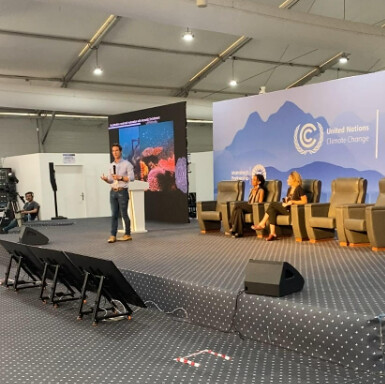 Before my arrival at COP27, I had a dream that I could open any book, jump into its pages and be immersed in its story. I woke up imagining all the stories I would want to live. But simultaneously I thought of the stories I would not want to experience. These are the ones that frightened me or made me feel anxious, alone, helpless.
Before my arrival at COP27, I had a dream that I could open any book, jump into its pages and be immersed in its story. I woke up imagining all the stories I would want to live. But simultaneously I thought of the stories I would not want to experience. These are the ones that frightened me or made me feel anxious, alone, helpless.
It is during my past two days at COP27 where I have had the opportunity to jump into a glimpse of people’s stories from around the world surrounding climate change.
During my first encounter at the conference, I met Briony McDonaugh, a professor at the University of Hull. She described her research that studies the effectiveness of using storytelling to get communities to care and act on climate change. Her research has shown storytelling to be an incredibly effective tool when dealing with the climate crisis. This concept was fascinating to me and compelled me to seek out stories.
Later that day I attended Lalela uLwandle (Listen to the Sea): spiritual, cultural and scientific understandings of the oceans in a time of climate change. This was a play communicating the stories of coastal South African communities. The theater group described their process of collecting stories from real people affected by the destruction of the South African coast and sea. The actors’ emotion and the powerful contents of the play left me in tears and I was struck with such a powerful story.
The COP is a space for negotiations, politicians and world leaders, but I have found it is also a catalyst for storytelling. Such stories may not always be the ones we want to hear. But they are important and need to be amplified so that we may deal with this crisis at face value. At the “Global Farmer’s Market”, farmers from Puerto Rico, Cambodia, India and others shared stories of struggle; lack of financial support, lack of technology and a need to restart their farms every year when extreme weather and disaster strikes. I wonder if these stories lack the amplification for those in positions of power to hear. By this I don’t just mean world leaders, but also administrators, CEOs, local government and more. COP is somewhere when I have been able to hear such stories. It seems when I am at UConn, I am not forced to see the effects of climate change everyday. But here, people are sharing and communicating real life affects that threaten their livelihood.
While there are many other stories heavy with fear and despair, there are also many stories of hope. Today – on my third day at COP – I heard a talk called “Google Arts: Calling in Our Corals” hosted by a team that developed research into a project for coral reef restoration. They explained their process of collecting underwater sounds from coral reefs in which they train people to acknowledge when they hear fish sounds in the recordings. This data is then used to program AI to do the same thing which is used to measure the health of the reef. What they found is that if they have a reef that is in need of restoration but lacks biodiversity, they can play the recording in an underwater speaker to attract the fish back to the reef to increase its biodiversity and thus its health. After the presentation I had the chance to speak with the head of the project. With confidence he said “I believe we will get through this climate crisis”. While only a small remark, it struck me as it can seem there is no progress being made. The pace of negotiations and frustration at the conference can make our future seem bleak. But is it with the story of hope that my presence at the conference seems worth it. There are so many people at COP that are here because they care about this crisis and it feels powerful to have them all congregated in one space.
As I have been able to jump into a variety of stories, I feel as if I am able to acquire new knowledge that I will be able to translate into my future work. It seems COP27 has allowed me to live out a dream in reality through voices of diverse storytelling. Yet still, as negotiations wrap up in these next few days, I wonder what will be the story of COP27? What will we look back on these past two weeks with triumph? Or wish we would have done more? Will our children and our children’s children be satisfied with the story we tell?